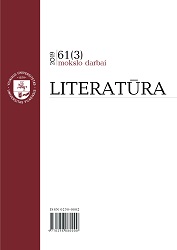Tarp tropų ir pragmatikos: Pasikalbėjimo lenko su lietuviu retorinis aspektas
Between the tropes and pragmatics: The rhetorical aspect of Rozmowa polaka z litwinem
Author(s): Skirmantas KniežaSubject(s): Political history, Pragmatics, 16th Century, Rhetoric
Published by: Vilniaus Universiteto Leidykla
Keywords: Augustinus Rotundus; Rozmowa polaka z litwinem; rhetoric; Grand Duchy of Lithuania; Early Modern Nationalism; Stanisław Orzechowski;
Summary/Abstract: This paper presents rhetorical aspects of a sixteenth century Lithuanian polemical treatise “Rozmowa polaka z litwinem” (“Pasikalbėjimas lenko su lietuviu”). This anonymous work is often labeled as “humanist”. Even though many scholars analyse its contents and emphasize references to the Classical Antiquity, formal aspects and their pragmatic implications remain unevaluated. Scholars have mainly focused on the issue of it authorship and quoted it illustrating cultural and political sixteenth century changes in the Grand Duchy of Lithuania. The main aim of this article is to reveal rhetorical tropes and figures employed by the author of the treatise and discuss the possible motivation of their selection. “Rozmowa” responds to, “Quincunx”, written in 1564 by a Polish polemist Stanisław Orzechowski (1513–1566). It is a part of a prolonged polemic between the later and Lithuanian Chancellor, Palatine of Vilnius Mikalojus Radvila “The Black”. The details and the course of their dispute is reconstructed by Orzechowski himself in the letter to Piotr Miscovius, which also is titled “Apologia pro Quincunce”. He refers to the “Rozmowa” without mentioning its title or particular author. Historiography attributes it to the Vilnius mayor (wójt) Augustyn Rotundus (c. 1520–1582). Both Orzechowski and Rotundus studied abroad and had spent some time in Italy. Not only curricula of their studies of artes liberales were influenced by Classical Antiquity, they also undoubtedly got familiar with humanist culture of the contemporary Europe. “Rozmowa” consists of two main parts, which are separated by a verse. The treatise is written in a form of a dialogue, and allows to portray a vivid discussion and multiple points of view. The first part of “Rozmowa” focuses on the questions of the political theory, whereas the second one is dedicated to the history of Lithuania, its dynasty and the issue of the Polish-Lithuanian Union. While the first part is polemical, the second one has epideictic character. The author employs personification, paradiastole and antithesis. The latter two allow changing the normative contents of political concepts, and irony highlights the absurdities in the Polish political practices. The Lithuanian, one of the characters, uses deprecation and interpellation, addresses the absent participants of a dialogue (e. g. Orzechowski himself). The author quotes Ancient authors, Scripture, Church Fathers and contemporary thinkers (e. g. Machiavelli and Erasmus), whose ideas provide him with literary topoi. Merged with the rhetorical techniques, they constitute the political arguments of the treatise and allows the author to express one’s political ideas.
Journal: Literatūra
- Issue Year: 61/2019
- Issue No: 3
- Page Range: 86-97
- Page Count: 12
- Language: Lithuanian

